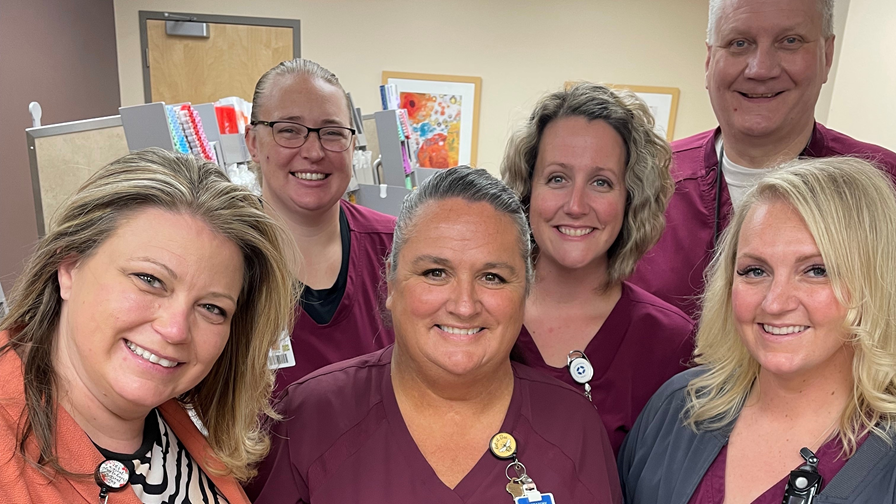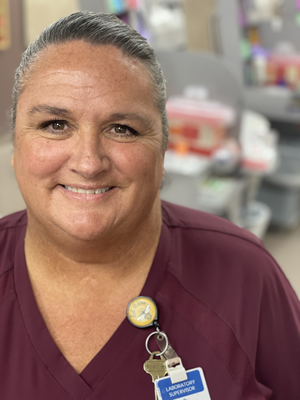
When Jeanette Clark, phlebotomy supervisor at McKay-Dee Hospital, saw her team’s Caregiver Experience Survey scores in 2018, her heart sank. She knew what the scores meant: a tier III team. Morale was low, burnout was high, and she knew something needed to change. At that moment, she made the decision to get her team in a better place and back to a tier I team. And that’s exactly what she’s done.

Jeanette Clark
Jeanette has been a Lab supervisor for more than 17 years, and she’s always had great caregiver engagement scores. But that changed in 2018. A systemwide reorganization that did away with the seven-on/seven-off schedule for phlebotomists, a lack of consistent staffing support, caregivers not feeling valued, and COVID-19 all combined to send Jeanette’s teams’ scores plummeting.
Her caregivers had thrived with the seven-on/seven-off schedule and appreciated the time to rest and recharge. Thanks to the schedule change, she lost 16 phlebotomists—almost half of her staff—in two months.
Taking ownership
Jeanette took full accountability for the low scores and dug deep to help her team succeed, often working 14-16 hour shifts alongside her caregivers.
“I felt like I’d let my team down, and I needed to do some pretty heavy self-reflecting on my behaviors to earn back their trust and respect,” Jeanette says.
Jeanette wanted her caregivers to know she was empathetic to their situation, and she had their best interest at heart. She also wanted them to know that as their leader, she would be transparent and trustworthy.
Owning the message
Jeanette decided to own system messages, talking about the changes in a positive light and explaining why the changes were made.
“When you’re a leader, even if you don’t agree with the changes, your commitment is to tell your team about them in a positive light,” Jeanette says. “I tried to lead out, giving them knowledge so they could feel best about the message.”
She explained why Intermountain decided to make these changes—to be fair and equitable to all phlebotomists as some were working eight hour shifts five days per week. But that’s not all she did. She really wanted to find a middle ground where phlebotomists could have more than two days off at a time while still following the organization’s policy.
Finding a middle ground
Jeanette didn’t have all the answers, so she rallied her team to come up with a solution.
“Rather than dismissing their concerns and complaints, I asked them for solutions, and they came up with a great plan,” Jeanette says.
Previously, phlebotomists at McKay-Dee were covering separate inpatient, outpatient, or ER shifts, but they devised a plan to cross over and cover inpatient rounds, followed by an outpatient shift. This allowed them to work 10-hour combined shifts and gave the opportunity to schedule three days off to recharge from their rigorous schedule.
“It really empowered them to solve problems on their own,” Jeanette says.
Working together as one clinical team
Another reason morale was so low was because phlebotomists at McKay-Dee didn’t feel part of the clinical team, and patients saw them as a nuisance as they came to draw blood.
Jeanette’s team focused relentlessly on the patient experience. They were eager to feel part of the clinical team working together. Jeanette asked herself ‘how do I make them feel valued and help them have a sense of belonging?’
She told her caregivers, “We have control of our own reactions, and that’s what’s going to set the precedence for the nurses’ day, and the patients’ day.” This sentiment paved the way for phlebotomists to feel more collaborative with nurses and brought positive reactions from patients.
They started training seasoned phlebotomists to start IV lines when the nurses didn’t have time to put them in. This facilitated more collaboration and positive feedback from patients and caregivers alike. They started to see phlebotomists’ value rather than seeing them as an annoyance. Most recognized that everyone has the same goal: to provide the best care for patients.
Through this and other collaborations, Jeanette’s team began to feel respected for their skills and abilities, and they started introducing themselves as part of the care team. This meant so much to the phlebotomists. Over time, the stories shared in Jeanette’s huddles transitioned from negative experiences to positive stories of collaboration and value for the phlebotomists at McKay-Dee.
“The nurses have been so grateful, and I think we’re well on our way to creating a culture of positive intent,” Jeanette says.
Positively impacting patient and caregiver engagement
Patient engagement is strongly tied to how many times caregivers wake a patient up and stick them with a needle. Recognizing that phlebotomists have such a strong impact on patient engagement scores opened the door for more collaboration among Jeanette’s team and the other clinical caregivers.
“We’ve come a long way,” Jeanette says. “We’ve still got work to do, but in general, I believe caregivers are feeling trusted, valued, and needed for their skills and expertise.”
Natural redeployment
When COVID-19 reared its head in 2020 and Intermountain redeployed caregivers to various areas, phlebotomists at McKay-Dee were already cross trained. They could work in multiple areas of phlebotomy, creating local opportunities to support their own department.
Personal introspection and development
As a leader with a growth mindset, Jeanette felt the need to reinvent herself and reignite her commitment to empower and engage her team through change. She worked with her HR business partner and took great strides to connect with empathy, building personal relationships with each team member. She led by example, never asking staff to work more hours than she did.
“I spent hours researching employee engagement, watching videos, reading books, and searching websites,” Jeanette says. “HR-playbook.com has some awesome tactics on how to build a culture of positive intent. I also learned about some great practices and tactics through Raise your Teams Employee Engagement Score, by Richard P. Finnegan.”
Through a lot of hard work, determination, and a simple desire to see her caregivers feel valued and respected, she helped her team raise caregiver experience scores from a tier III to tier I team.
As we approach the 2021 Caregiver Experience Survey, Jeanette’s story is a solid reminder that caregiver engagement is an active process that takes a growth mindset and a practice of leadership behaviors every day. For Jeanette, the outcome is a result of making changes every day and empowering her team. Her team scores are a byproduct of the great effort that has taken place between leader and caregiver.
“It took me two years to climb out of the hole we were in, but we did it, and I believe we’re in a lot better place now,” Jeanette says.
Jeannette is looking forward to the 2021 Caregiver Experience Survey as an opportunity to continue improving herself and her team.
Caregiver Experience Survey 2021
All caregivers are invited to share their voices through this year’s Caregiver Experience Survey, September 30 through October 21. The valuable feedback we gain from this survey helps us understand what we’re doing well and the areas where there’s an opportunity for improvement. Please take time in huddles and team meetings during the next month to talk about this year’s Caregiver Experience Survey and encourage everyone to participate. Survey fast facts:
- September 30 to October 21
- 15 to 20 minutes to complete
- The survey is administered by Press Ganey
- All caregivers hired before June 28 will receive a unique link to take the survey
- The survey will be offered in both English and Spanish for the first time this year
- Survey results are confidential—no personal identifiers are included in the results
- Survey results will be available in November
- Team survey results will be generated with five or more respondents
- You’ll be asked to share results with your team and create meaningful improvement plans to enable a better caregiver experience
- You’ll have access to view your direct report’s open-ended comments
Learning opportunities for leaders
Intermountain offers leaders many opportunities to learn and grow. Advance your individual development plans and meet emerging needs through classes and programs, coaching and mentoring, on-demand learning including Harvard ManageMentor and SPARK. Udemy for Business is accessible for all caregivers. Visit the Leadership Development website for more information.
For accredited continuing education opportunities visit CloudCME, Intermountain's interprofessional continuing education learning management system. IPCE offers a variety of education and training for physicians, APPs, nurses, pharmacists, and other clinical or nonclinical caregivers.

